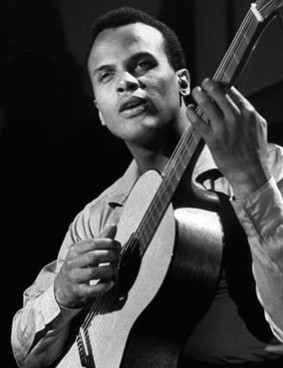Books and Arts; Book Review;

It all began with a set of Venetian blinds. In 1946 a couple in a Manhattan apartment building asked their janitor, a biracial Jamaican New Yorker newly returned from naval service in the second world war, to install a set in their flat. The task completed, they gave him two theatre tickets as payment. The janitor, having no money for the dinner that a proper date would have included, went on his own to see “Home is the Hunter”, a play about black servicemen returning to America after the war. He was enraptured.
故事還要從一扇百葉窗說起。1946年有一對夫妻住在曼哈頓一棟公寓樓里,公寓看門人,一個有著牙買加血統的紐約小伙子,剛從二戰的海軍服役中歸來。一天這對夫婦請他幫忙安裝一扇百葉窗,當小伙子任務完成后,他們給了他兩張戲院的門票作為酬謝。考慮到付不起一次體面的約會必要的晚餐錢,看門人獨自去看了《家是獵人》(Home is the hunter)。這部戲講了一名黑人軍人戰后回美國的故事,小伙子看得入了迷。
The tenants, Clarice Taylor and Maxwell Glanville, performed in the play, which was put on by the American Negro Theatre (ANT). The janitor was, of course, Harry Belafonte.
這部戲在美國黑人劇院(the American Negro Theatre ,ANT)上演,這對房客夫妻,Clarice Taylor 和 Maxwell Glanville,也參與了演出。這個看門人,當然就是故事的主人公亨瑞.貝拉方特(Harry Belafonte)。
In short order Mr Belafonte also found his way into the ANT, where he not only acted but made “my first friend in life”, another poor, hustling West Indian named Sidney Poitier. The two of them hatched get-rich-quick schemes—Mr Poitier wanted to market an extract of Caribbean conch as an aphrodisiac—and they shared theatre tickets: they could only afford a single ticket between them, so one would attend before the interval and one after, then each would fill the other in. Mr Poitier got his break first: he took Mr Belafonte's place in a play that the latter, still employed as a janitor, missed because he had to collect his tenants' rubbish. It took Mr Belafonte several more years of struggling, and he gained fame not as an actor, for which he had trained, but as a singer, for which he had not, filling time during the interval at Lester Young's concerts, where his first backup band included Max Roach and Charlie Parker.
Belafonte先生迅速地找到了進入ANT的方法,在那里他不僅練習表演,還交到了人生中第一個朋友Sidney Poitier,也是一個貧窮的拼命賺錢的小伙子,來自西印度群島。兩人一起策劃出“快速來錢的計劃”——Poitier先生想販賣一種加勒比貝殼的汁液做成的催情劑——還一起分享戲院門票:兩人只負擔的起一張門票錢,所以往往一人觀看上半場,另一人觀看下半場,然后互相幫對方把整部戲串起來。Poitier先一步時來運轉了:他在一部戲里替代Belafonte的角色,此時還在做看門人的Belafonte正在清理房客的垃圾,無奈錯失良機。這使Belafonte花了更多年時間努力掙扎,終于贏得了名望,卻不是作為一名專業的演員,而是一位業余的歌手。他在演出的幕間休息時去聽Lester Young的演唱會打發時間,在那里遇到了他第一個后備樂隊(the Charlie Parker band,譯者注)的成員Max Roach 和 Charlie Parker。
Looming over both this book and its subject's life are two ghosts: Millie, his formidable, perpetually dissatisfied mother; and Paul Robeson, whose combination of entertainment and political activism forged a path that Mr Belafonte would follow. But whereas Robeson's activism ran headlong into early cold-war paranoia, blacklists and McCarthyism, Mr Belafonte was luckier: his career rose more or less in tandem with the American civil-rights movement.
在書中及主人公的生活中投下陰霾的鬼影,是Millie,令他畏懼的永遠不滿足的母親;以及Paul Robeson,以政治激進主義為樂,并為Belafonte打造了一條政治道路。然而,盡管Robeson的激進主義使他盲目崇尚早期冷戰偏執、黑名單、以及麥卡錫主義,Belafonte則更幸運:他事業的成就或多或少與他參與美國人權運動有關。
Martin Luther King junior sought him out in 1956, just a few months after rising to fame during the Montgomery bus boycott. King was then 26, and a preacher at the Dexter Avenue Baptist Church in Montgomery, while Mr Belafonte was 28 and newly crowned “America's Negro matinée idol”. Mr Belafonte was sceptical of both religion and non-violence (“I wasn't nonviolent by nature,” he explains, “or if I was, growing up on Harlem's streets had knocked it out of me”), but was won over by King's humility. There is an especially touching scene from nine years later in which, following a celebrity-studded civil-rights fund-raiser in Paris, King, then a Nobel peace-prize winner, serves food to the assembled stars as “an exercise in humility, an act of abject gratitude to all these stars for coming out for him.” In a book that is riddled with many of the usual faults of celebrity autobiography—name-dropping, score-settling, preening and a rather ungallant treatment of his first wife and some of his children—Mr Belafonte's portrayal of King stands out for its unfussy warmth and unhagiographical affection.
1956年,在蒙哥馬利市(Montgomery)公車抵制運動后的幾個月,在運動中聲名鵲起的馬丁路德金(Martin Luther King junior) 找到Belafonte。當時,26歲的King是蒙哥馬利市Dexter Avenue Baptist Church 的傳教士,28歲的Belafonte則是新晉的“美國黑人白天音樂會偶像”。Belafonte對宗教和非暴力皆持懷疑態度(“我天生就不是非暴力”他解釋說,“就算我本性如此,在Harlem大街(紐約黑人住宅區,譯者注)的成長經歷也會使我脫離這種本性。”),但他被King的謙遜打動了。最觸動人心的一幕發生在九年后,在巴黎舉辦的一場名人云集的民權基金募集會后,已經獲得諾貝爾獎的King在就餐時為那些名人服務,作為“謙虛的表現,以及向為他而來的明星們表達的一點感激”。在這一本漏洞百出的書里,充滿著通常明星自傳中常有的缺點——自抬身價,利益相爭,自我夸耀,以及甚至是無理的態度對待他的第一任妻子和他的某幾個孩子——而Belafonte對King的這段描寫,因為其平和的溫暖以及不歌功頌德的感情流露而顯得尤為突出。
After the 1960s, “My Song” goes downhill quickly, but that is hardly a surprise: maintaining fame is never as interesting as achieving it. The book is also too long. Mr Belafonte's ramblings about business deals that went sour and his agonising over the extraordinary privileges his children enjoyed grow tedious. And then there is his political judgment. Standing with Martin Luther King junior to fight injustice and oppression is quite different from standing with practised political oppressors such as Hugo Chávez and Fidel Castro. Still, Mr Belafonte does have a remarkable song to sing. Given its breadth, and the welcome disappearance of the segregated world in which it began, such a song will not be sung again.
20世紀60年代后,很快Belafonte的事業開始走下坡路。但這絲毫不令人感到意外:守城永遠沒有攻城有意思。Belafonte的這本自傳也長的讓人生厭:Belafonte漫談他不太順利生意,Belafonte煩惱他家小孩享受特權,這些描寫冗長又乏味。接著是他的政治判斷:支持Martin Luther King junior反對不公正和壓迫,與支持老練的政治壓迫者,例如Hugo Chávez 和 Fidel Castro,是不盡相同的。鑒于年代的局限性,以及當時種族隔離的世界順應人心地消失,Belafonte的這首生命之歌,將不會再被奏響。











